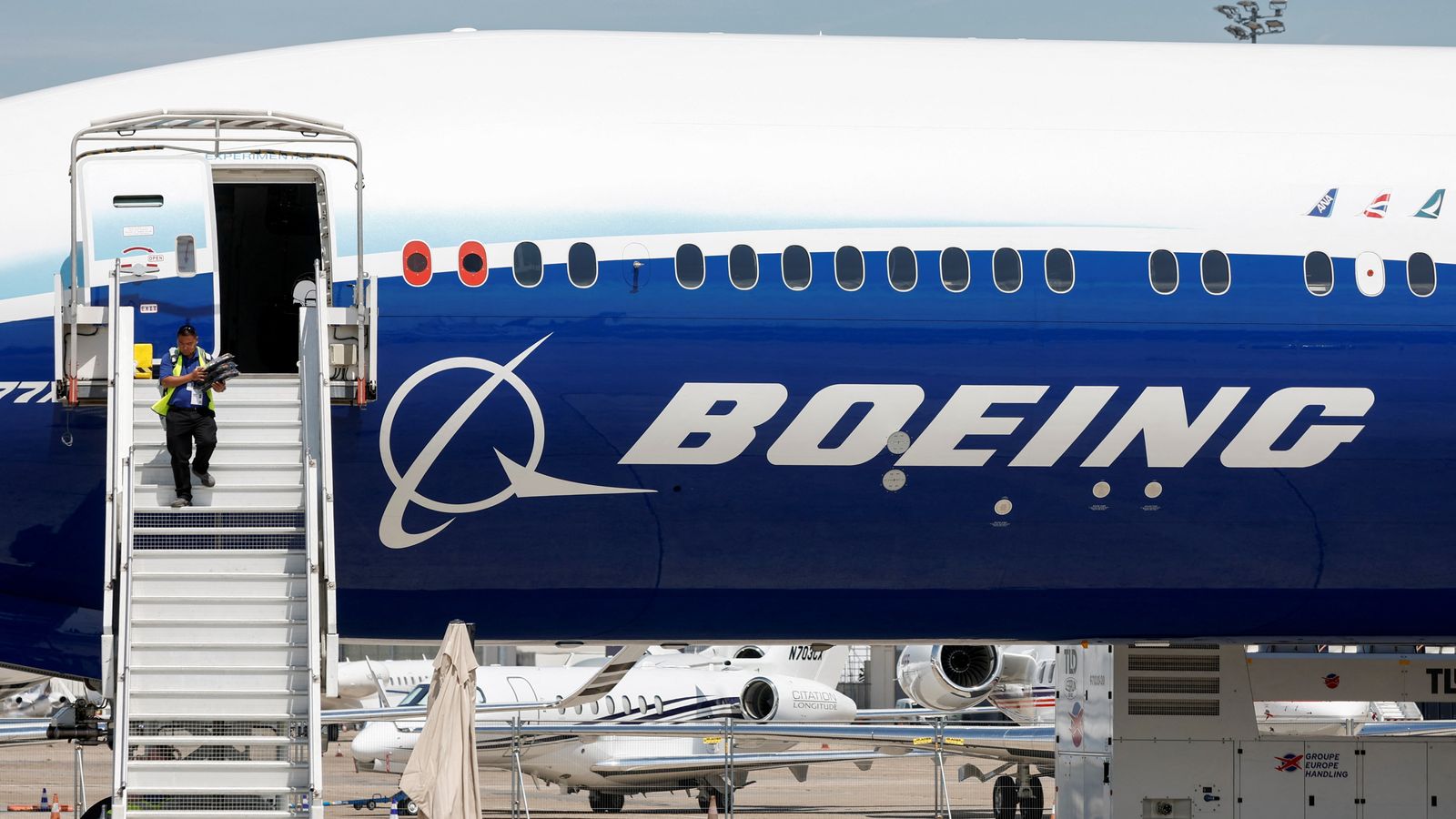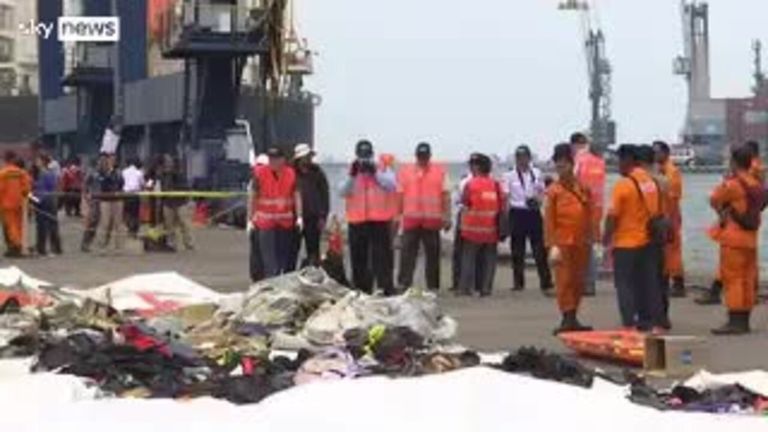After a four-month search, a candidate has been found to fill one of the toughest jobs in global business – chief executive of Boeing.
Succeeding Dave Calhoun, who was put in the ejector seat in March following the latest crisis to have engulfed the company’s 737 MAX jet, will be Kelly Ortberg.
Mr Ortberg, 64, ticks several of the boxes demanded by investors.
Money latest: Major banks cut rates ahead of BoE announcement on Thursday
Firstly, he is a qualified engineer, with a degree in mechanical engineering from the University of Iowa.
Secondly, he has more than three decades of relevant experience in the aerospace industry, having spent most of his career at Rockwell Collins, a provider of avionics and information technology systems to aircraft manufacturers, which he joined in 1987.
His career culminated in him becoming chief executive in 2013 and he held the post for four years until the company was taken over for $23bn by United Technologies. United, the owner of aircraft engines manufacturer Pratt & Whitney, merged the following year with Raytheon, the manufacturer of the Tomahawk cruise missile, to form RTX – a company on whose board Mr Ortberg has remained.
Thirdly, and crucially, Mr Ortberg – who starts in the job on 8 August – is an outsider who can therefore bring a fresh pair of eyes to Boeing.
Steven Mollenkopf, who became chairman in March, said: “The board conducted a thorough and extensive search process over the last several months to select the next CEO of Boeing and Kelly has the right skills and experience to lead Boeing in its next chapter.
“Kelly is an experienced leader who is deeply respected in the aerospace industry, with a well-earned reputation for building strong teams and running complex engineering and manufacturing companies.”
Boeing had to waive its company retirement age of 65 in order to appoint Mr Ortberg – just as it did when Mr Calhoun passed the age of 64 three years ago.
Mr Ortberg beat strong competition for the job.
Stephanie Pope, who was made head of Boeing’s commercial aircraft operation in the management shake-up in March, was seen as the leading internal candidate – but probably lost out because investors had made clear they wanted an outsider.
The leading external candidate until this week was thought to be Pat Shanahan, the new chief executive of Spirit AeroSystems, the Wichita-based company which built the fuselage for the 737 MAX 9 jet, operated by Alaska Airlines, which in January suffered a mid-air blow-out.
Boeing last month agreed to buy Spirit and that was seen as making Mr Shanahan, who worked for Boeing for 31 years, a prime contender.
The other hot favourite from outside Boeing was Larry Culp, the chief executive of GE Aerospace, but the Wall Street Journal reported last month that he had turned down the role.
Wall Street has welcomed the news and Boeing shares were ahead by almost 2.5% at one point this afternoon.
Ken Herbert, analyst at brokerage RBC Capital Markets, told clients in a note: “This is a strong and safe pick. We can appreciate Ortberg’s age may be higher than some investors would have liked to see. However, we believe Ortberg’s reputation at Rockwell Collins and United Technologies/RTX is strong.”
And Sheila Kahyaoglu, managing director in equity research at the investment bank Jefferies, told CNBC: “He’s a listener and Boeing needs someone who listens – to the FAA (the main US aviation regulator), to the workforce, to suppliers.
“He was a big supplier himself at Rockwell Collins and he grew revenues – he was an organic growth driver.
“All in all Kelly is the next best thing from Larry Culp, who was everybody’s number one pick, but I think he’s going to be well-liked by the workforce – and Boeing really needs that.
“Kelly will bring listening to the workforce, will be more present with them, and I think that will go a long way.”
Ms Kahyaoglu said Mr Ortberg was more likely to make an immediate impact at Boeing and contrasted this with how Mr Calhoun replaced Dennis Muilenburg, who was fired just before Christmas in 2019 after two crashes, killing 346 people, involving the 737 MAX family.
She added: “Dave took over during the pandemic, which was pretty difficult, and he had a learning curve. With Kelly, the difference is he ran an aerospace company for a very long time, he was an engineer.”
She said she expected Mr Ortberg to make talking to Boeing’s customers his first priority.
The size of Mr Ortberg’s task was underlined this afternoon when Boeing, which has not reported an annual profit since 2019, published its latest financial results.
A loss of $1.44bn for the three months to the end of June, up from one of $149m in the same period last year, was worse than expected. Group sales of $16.87bn, down by 15% on the same period last year, were well below the $17.4bn that Wall Street had been looking for.
In Boeing’s commercial aircraft operation, sales fell by 32% as Boeing delivered just 92 planes during the quarter to its airline customers, down from 136 last year.
The FAA imposed limits on the number of 737 MAX aircraft after the Alaska Airlines incident but Boeing is not even at those limits – yet today the company repeated that it was still hoping to be producing 38 of the aircraft per month by the end of the year.
More from Sky News:
Worst airlines for customer service named by consumer group
TikTok HQ staff hit by poisoning outbreak
While Boeing’s problems in commercial aircraft have been well-documented, the company – which has 170,000 employees worldwide – also has challenges in its defence division, a major supplier to the US Pentagon and to NASA.
The company’s defence, space and security division lost $913m during the quarter, up from $527m in the same period last year, with a number of projects suffering cost over-runs. These include the KC-46A Pegasus tanker, a military aerial refuelling and transport aircraft being developed for the US Air Force and the VC-25B, the long-delayed replacement for the Air Force One aircraft that transports the US president.
Also under scrutiny is Starliner, the reuseable spacecraft designed to carry astronauts to the International Space Station, which remains docked to the station after more than seven weeks – having originally been due to return to earth after a week.
So, quite an inbox for Mr Ortberg. This important company’s many stakeholders around the world, not least customers like Ryanair, will wish him well.



